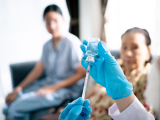May 14, 2007 (CIDRAP News) – The dispute over the sharing of H5N1 avian influenza samples was high on the agenda as the annual meeting of World Health Organization (WHO) member countries began today in Geneva.
Indonesia has been withholding H5N1 virus samples since the start of this year out of fear that drug companies would use them to make vaccines priced beyond the country's reach. WHO officials hope to solve the problem by the time the 60th World Health Assembly (WHA) ends on May 23.
"We hope that it [the standoff] will be fully resolved during the assembly," WHO spokesman Iain Simpson told Agence France-Presse (AFP), according to a story published yesterday.
The 193 WHO members will also consider whether remaining smallpox virus stocks should be destroyed, launch a massive yellow fever vaccination campaign in Africa, bolster polio eradication efforts, and examine the effect of climate change on health, according to WHO documents and news agencies.
The United States' top health official weighed in on the virus-sharing dispute today, urging all countries to share samples without attaching strings, according to an AFP report today.
"We continue to call on countries everywhere to share influenza samples openly and rapidly, without preconditions," US Health and Human Services Secretary Mike Leavitt was quoted as saying.
The WHO has coordinated the international sharing of flu virus samples by national and WHO collaborating laboratories for more than 50 years. Samples of both seasonal flu viruses and novel strains like H5N1 are used to monitor viral evolution and drug resistance and to develop vaccines.
After a meeting in late March, Indonesian officials said they would resume sharing the virus samples immediately, in return for a WHO promise to revamp its sample-sharing rules.
But Indonesia has continued to withhold the samples, saying it wants a written guarantee that they won't be shared with drug companies without the country's consent.
According to yesterday's AFP report, a senior Indonesian health official said the country would urge WHO members at the meeting to scrap the existing policy on sharing of samples.
A WHO staff (Secretariat) report prepared for the WHA outlines "best practices" for sharing of flu virus samples, as approved by the WHO's Pandemic Influenza Task Force at a meeting last September. The report:
- Calls on member countries to continue sending flu virus specimens to the WHO
- Says WHO collaborating and reference labs should provide flu virus samples to vaccine producers for the "sole purpose" of developing safe and effective vaccines
- Encourages vaccine producers "to expand production and/or transfer technology in order to increase the supply and availability of influenza vaccines globally"
- Says WHO collaborating labs should not use virus samples for purposes other than public health risk assessment and vaccine development without permission from the source country
- Says neither WHO collaborating centers nor national labs should sell virus specimens or otherwise try to profit from participating in the WHO's surveillance network
- Urges WHO collaborating centers and national labs not to impose "agreements or administrative procedures" that would inhibit WHO flu surveillance
- Urges member countries that have flu vaccine supplies and access to other flu protection technologies to make "specific efforts" to share these benefits with countries that lack them
In other business at the WHO meeting, Director-General Margaret Chan will ask members to approve a 15% increase in the agency's budget for 2008-09, to $4.2 billion, according to AFP.
The meeting is also scheduled to officially launch a 4-year campaign to vaccinate 48 million people in 12 African countries against yellow fever, the story said. The WHO estimates that yellow fever attacks 200,000 people in Africa and Latin America each year and kills 30,000, AFP reported.
See also:
WHA journal with schedule
http://www.who.int/gb/ebwha/pdf_files/WHA60/A60_J-en.pdf
Report by the WHO Secretariat on "Avian and pandemic influenza: Best practice for sharing influenza viruses and sequence data"
http://www.who.int/gb/ebwha/pdf_files/WHA60/A60_ID1-en.pdf
WHO staff report on destruction of smallpox virus stocks
http://www.who.int/gb/ebwha/pdf_files/WHA60/A60_ID1-en.pdf
Report of the eighth meeting of the WHO Advisory Committee on Variola Virus Research
http://www.who.int/gb/ebwha/pdf_files/WHA60/A60_40-en.pdf
















